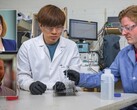Total surveillance always sounds a bit dystopian. Yet some homes are probably not far away from such a scenario. The smart loudspeaker listens in, the TV recognizes whether anyone is watching and the robot vacuum cleaner reliably makes its rounds because it sees and avoids every obstacle. Not to mention the semi-autonomous car on the road that constantly films its entire surroundings and exchanges data with the cloud.
All these systems are practical, make everyday life easier and can even save lives in an emergency if, for example, the safety camera can detect and report a serious fall or the car independently initiates emergency braking. At the same time, the recordings made are basically always exchanged with the cloud.
An extensive study by MIT shows just how poorly secured this can be and what juicy recordings can end up freely accessible on the internet.
Only transmit the necessary information

In many cases, the cameras do not even need to recognize the person themselves. The smart home environment is almost always only concerned with where someone is, whether he or she is standing, lying down, sleeping or perhaps has a fever.
The aim is therefore to give the smart device, and therefore the company behind it, only the information it needs while at the same time preserving privacy. This is comparable to the frequent request for the date of birth, which many online services justify by stating that the age of majority must be confirmed. Actually nonsense, because "yes/no" would suffice here.
Researchers at the University of Michigan have set themselves the task of removing people from recorded videos while still being able to determine their position and movement. This is achieved with a combination of a normal and a pure infrared sensor. Both images are superimposed and processed before the image is output.
Based on the heat signature, the system recognizes that it is a person and immediately replaces them with a figure consisting only of lines. The information on location and movement is retained, but appearance, clothing, etc. have been removed from the video.
This could preserve a great deal of privacy, for example in the case of necessary medical monitoring of people with impaired health. Car manufacturers, who need recordings of passers-by and their entire surroundings for their autonomous systems, would also be able to comply with current laws again instead of arbitrarily recording, storing and processing everything.
The situation is similar when it comes to monitoring public spaces. Here, too, it is often only the number of people and their movements that are to be determined and not who they are specifically. Flooding the world with a little less information is certainly not the worst approach.













